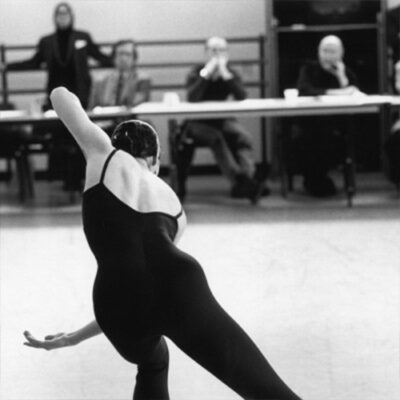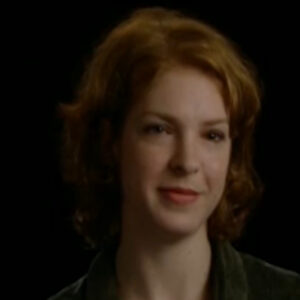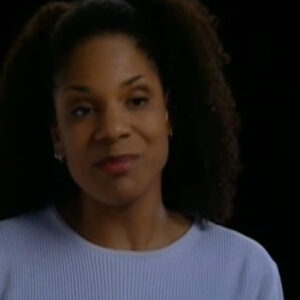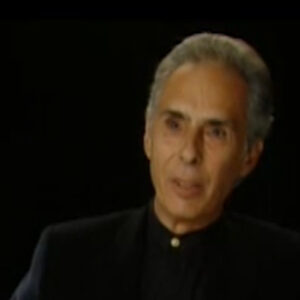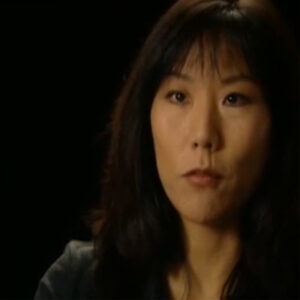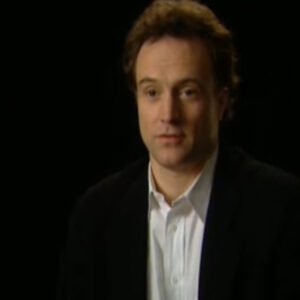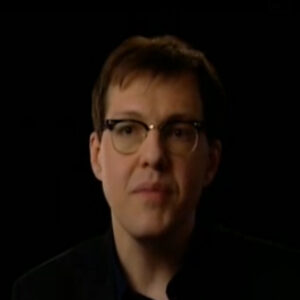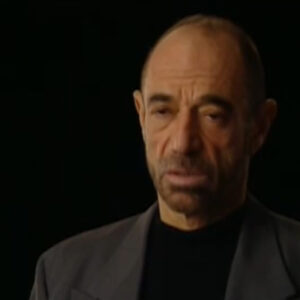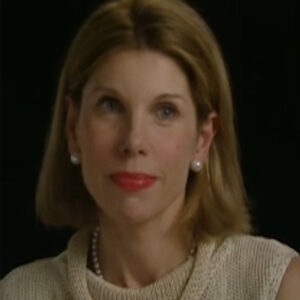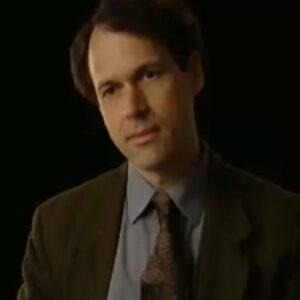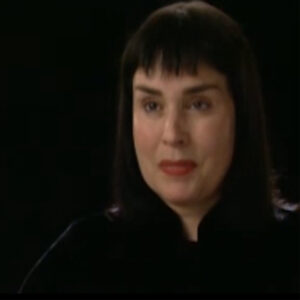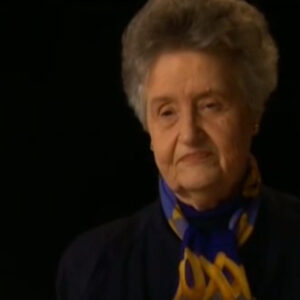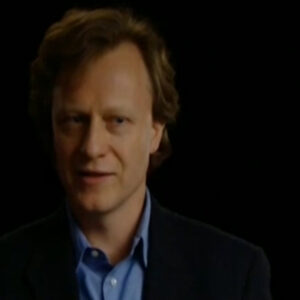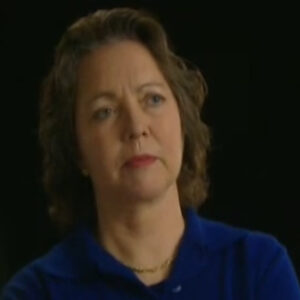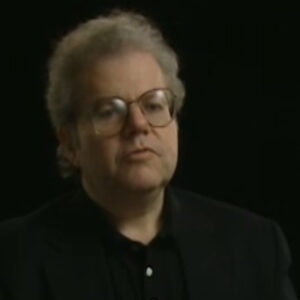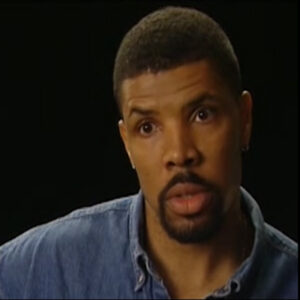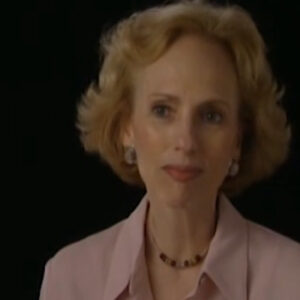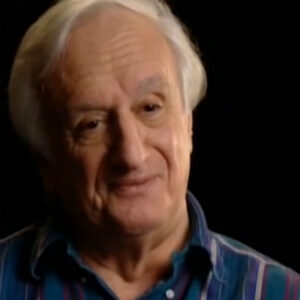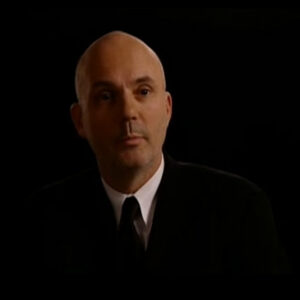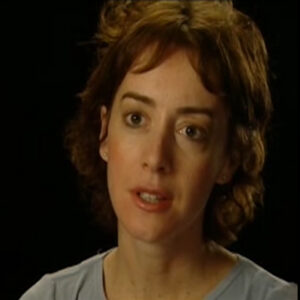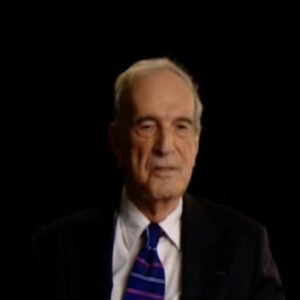Speaker When I was a junior in high school in Baltimore, I thought I wanted to either be a painter or a dancer. And my dance teacher at the Peabody Conservatory in Baltimore, Dale Center, said, why don’t you audition for Juilliard and see how it goes? So he choreographed a little piece to Brahms lead levels.
Speaker Later, Wallace and I auditioned with three other girls. One was from Texas, who I still see.
Speaker And I went to the stage up on Claremont Avenue at the building.
Speaker And this very important faculty was sitting at tables at the end of the stage.
Speaker And I was terrified.
Speaker And we first had to stand in profile to the faculty so they could see if we had curvature of the spine. And what like like you were at a horse sale, you know, just to look at anatomy. And there was murmuring. I do remember kind of or it was like for a mugshot for the police.
Speaker And then I did my solo and then they put us through a kind of ballet and modern dance syllabus where you had to do various movements that are standard for any dancer.
Speaker And they ask me and my mother to stay.
Speaker And said, would you like to come next year, even though you haven’t graduated from high school? And that happened right away, as I remember, and I was blown away, so painting went out the window.
Speaker I could get out of high school to go to Juilliard. I thought, I’ll be a dancer. And then I did this for years now.
Speaker What did you know that Juilliard. I mean, what got you down from Baltimore to. I mean, what was the mystique of it at the time? It was.
Speaker Well, I studied at the American Dance Festival with Louis Horst, who was a very, very famous choreography teacher and had been Martha Graham’s partner in a sense, and composed for her. And I was at the American Dance Festival at the age of 15. And he liked me. He beat on me, but he liked me. And he suggested that I look to Juilliard for my future dance and music education.
Speaker And what was the what was the mistake of Juilliard?
Speaker I mean, we know we had this and it was oh, it was, you know, wholly it was the place to go if you had the talent and wherewithal to get in.
Speaker I mean, there was Sarah Lawrence and Bennington as a possibility for me, but I was academically not driven at all. I like to dance and doodle on paper.
Speaker And I think it was, you know, the creme de la creme to study at at that time and probably still is.
Speaker And talk about the the environment there when you were first there, the classroom, I mean, OK, you’re young, you’re 16.
Speaker Oh my God, you I mean.
Speaker Well, I was I had then by then turned 17 by the time I began my first year. But I lived at the Barbizon Hotel for women and used to take the bus up Fifth Avenue. I mean, I was a yokel from Pikesville, Maryland, and I think at the time New York seemed less threatening. It was just the beginning of the sixties. I mean, I think I had my son want to go to Juilliard. I would have been very nervous about it that many years later with drugs and crime and whatever, we all had a kind of happy naiveté about it all. And I was going to New York to become a dancer.
Speaker The the building was somewhat institutional and dark.
Speaker The dance studios were on the sixth, sixth floor and it was wonderful, kind of rubbing elbows with singers and musicians and great faculty. The Juilliard String Quartet in the elevator. I had a little crush on Walter Traveler, the violist. He wore beautiful suede shoes and English suits. And I used to like to get in the elevator ride to the sixth floor with him. And I met him a few months before he died. And I said I was a student who had a crush on you, but it was very intense. I got to school at eight in the morning and left often at 9:00 or 10:00 at night. If I was lucky enough to be chosen for production, I had no other life, really. I wanted to be a dancer.
Speaker You know, in the strongest way and it was a little bit like being in a convent for four years. More on atmosphere.
Speaker Well, now, you know, we’ve seen these unbelievable stills, you know, at that time in somebody, you know, in the 50s, even earlier. Yeah. You know, we’ve seen these unbelievable photographs during times when, you know, when racism was so rampant and we’ve seen unbelievable photographs of of the new the Juilliard dining room with people and, you know, bow ties.
Speaker And, you know, it seems so much more kind of formal.
Speaker Yeah, well, I don’t remember. It is formal. I remember being in black leotard and tights for four years and never out of them. And even if I dressed up to go out in the evening, I’d be coming sweaty from a rehearsal and throw something over black tights. I don’t remember that people it was a little bit segregated in the fact that I didn’t get to know people from other departments. Although you were eight in the lunchroom with them, we didn’t really mix too much. I think I dated Joshua Rifkin my first year and a conductor whose name I don’t remember O’Dare, but I, I don’t remember mixing with other people very much.
Speaker There was a program where we worked with young composers toward my third or fourth year, but I was Technik classes. I took an academic degree as well, but it just was from one class to the other.
Speaker And the buzzer after an hour, you know, I’d grab my sweatpants and go to the next place. I studied Latin notation.
Speaker I had a fantastic music history teacher. M. has been discussed in the literature and materials of music. In my freshman year there were 64 in my freshman year and four graduated. And I think the fallout was due to the demands of the classes and music and people just couldn’t take it away from sixty four to four.
Speaker Yeah, in my dance unit.
Speaker Was there a big cut when you were there.
Speaker Do you mean of telling people go, oh you had to audition at the end of each school year to get back in the following year in a sense and rather than being on the stage you would go to classroom. And again, this austere faculty, I mean, members of the Graham Company and Anthony Tutor and Jose Limone and Alfredo Corvino and Louis Horse and they’d sit with pads of paper. I do it now. So I know I feel terrible for people who come to audition, but they make it hard for you to continue and they want you to be very specifically, in a sense, what they feel is going to be a dancer that will really have a future or they let people go or people realize it’s going to be too hard. It’s like swimming upstream.
Speaker I had the right dancers body. I mean, physically, I fit into what they were looking for at the time.
Speaker If that I’m kind of rambling, but.
Speaker Yeah, yeah.
Speaker Um, but it’s interesting because there is this whole discussion, of course, you know, now the building is directly next to, you know, the New York City Ballet Studio. Yeah.
Speaker We call them Bunheads and and a lot of people that will come in will say the great thing about Juilliard is you don’t have to fit the mold. You don’t know.
Speaker It’s probably changed some because I think they’re I mean, I don’t think this is in a bad way, but it’s a very hard field and it takes an enormous amount of discipline. And there are a lot of setbacks. You know, if you have an injury, it’s a tough field to get into. It’s hard to find the choreographer, the company that you’re going to work with. Well, I mean, I joined Al Sockless Company. I met Arnold Socolow at Juilliard, but I was somewhat interested in being Graham dancers. I was somewhat interested in being a lemon dancer. I probably would have wanted to be Anthony Tooter dancer, but I didn’t have the natural turn out in my hips to be a ballerina. So that how your anatomy goes pretty much designates where you’re going to end up. I think dance has changed a lot. After I graduated from Juilliard, I danced professionally for three years and then quit for a number of years because I didn’t really know where I wanted to be.
Speaker It’s a it’s a have. To really want it badly to make a career of it, and I don’t imagine for my class, well, there were only four of us, I don’t know where anybody is except for myself.
Speaker Jennifer Muller was a very good choreographer and dancer in the class below me. But I don’t know how many people that I went to school with are still in it.
Speaker And I’m in my mid 50s.
Speaker Talk about and we have discussed this before, it was legendary, the quality of the faculty at that time. I mean, it was just the way they were. Yeah, the faculty was.
Speaker Absolutely amazing, it was coming together to study with the greats of that time in modern dance, José Lamon, Luigi Horst, as I mentioned, as the great, great choreography teacher.
Speaker And it’s a very hard subject to teach Anthony tutor, who I worshipped and made all the difference to me and still does of the Graham faculty, there was Helen McGehee, Mary Hinkson, Bertram Ross, Ethel Winter, Lemon Fakri was, of course, Jose Betty Jones, John Dunbar, who had been with Doris Humphrey, Alfredo Corvino, who was a charming and very kind ballet teacher you couldn’t have chosen.
Speaker Bigger stars in the field to study with than Juilliard offered at the time.
Speaker That’s why I went there, probably.
Speaker And where was Juilliard? I mean, what was the thought of with Martha Hill? I mean, you know much about the sort of history of how did Martha Hill get all these people? What was her lure?
Speaker I mean, she’s I knew less about her at the time, although she had when I went there, she had to know the background of the show. I think that she had been at Bennington and had founded the American Dance Festival.
Speaker Stop for one second. Yeah.
Speaker Instead of saying she you have to actually say, oh, Martha, Martha Hillhead. I’m not sure if she initiated the dance department at Bennington, but had been very important in bringing modern dance into education. And she went from Bennington to the American Dance Festival to Juilliard. But the truth is, I don’t know that much about how the dance partner, I imagine Martha Hill started the dance department, but I don’t know that much about that, honestly.
Speaker What was what was Martha held like herself? Martha Hill? Was that, from what I can hear, Karen so heavily. Can you hear me? Yeah, it’s just.
Speaker Yeah, well, Martha Hill was wonderful looking, she wore very high kind of stacked heels and a bun on the side of her head and she walked terribly directly as though there was a rod up her back.
Speaker And she had a rather strident voice.
Speaker And she would say, Martha, to me.
Speaker I remember she had incredible energy. She was very hands on as the director of the department.
Speaker She was character. And she would have been a wonderful character in a kind of Betty Davis film should large eyes and around face.
Speaker She was quite beautiful and in a very striking in a way. And even when I saw her many years after I graduated, she hadn’t aged at all.
Speaker The wonderful thing about dance, what it can, the vitality of loving it and having had it in your body, it can sustain people did Martha. And it’s amazing how many of my teachers in their 50s, 60s, 70s, even 80s who I occasionally run into have such an incredible vitality to them still because of having had that physical life and I suppose spiritual as well.
Speaker She was working in a teaching classes and, you know, she taught a class called a dancer herself.
Speaker I don’t know that I should probably have a feeling she was like a definition dancer, but I don’t know. She taught a course called History and Materials or a dance or something like that.
Speaker It was a dance history course.
Speaker You took your fourth year and I made a notebook. We had to put a notebook together. And I remember I didn’t feel like writing and I did it all with collage pictures of dancers through the ages and I passed.
Speaker How how unique do you think the program was sort of bringing divided camps of ballet and modern together? I mean, at that period and dance was like the sort of heyday of mother of modern coming in, really, I mean, or the heyday of the stars that we now refer to as the Graham technique there was before that.
Speaker So this was I mean, she was this was a it seemed to me that Juilliard was bringing together a sort of a ballet modern philosophy that allowing both to coexist with other schools have been so ballet driven.
Speaker I suppose it was equally driven for ballet and modern. First of all, to have a teacher like Anthony tutor if was unique internationally, to have this great, great choreographer teaching students. I was definitely a modern dancer. I had the instinct for it. I had the style for it. I was more of an earthbound dancer.
Speaker You could not I guess you could do a split major. But I think by my second year I was asked to decide what was going to be my major, and I graduated as a gram. Major choreography with Louis Horst probably. I didn’t know I wanted to be a choreographer. In those days at Juilliard, they were turning out. The emphasis was on performing and not on choreography. Was very, very fortunate to have him there. I doubt that I’d be doing what I’m doing had it not been for Louis. And his influence is still an influence in everything that I do as well as Anthony tutor. But in terms of I guess you had an education, be a well-rounded dancer. I studied Limón notation. I studied ballet every day. I studied Graham three days a week in London, two days a week. But ultimately they wanted each student to specialise in an area. And I specialized in Graham did.
Speaker I mean, we’ve talked about this before. Yeah, plenty.
Speaker But in a way, you’ve talked about Juilliard as the mentor experience in a way that it was really about the relationship to these people and how important that is, not just in dance, but maybe in all, you know, in arts education.
Speaker Yeah, yeah. We talked a little about the relationship with Junior and yeah, I, I think Juilliard was definitely the right place for me to be because.
Speaker I. Became very, very influenced by two great teachers, Anthony Tooter and Louis Horst, and they have affected everything I’ve ever done. For me, going to school is about teachers and I was very, very lucky to be there at a time. The two men were really instrumental in everything I felt and thought about my field since then, so that the school experience, I’m not sure you learn to be an artist in school. I think school and Juilliard are wonderful for those people who can influence you and who for the teachers who take an interest in you and those two teachers. Although it was not a ballet dancer tutor, when I would show my work, he would stop me in the hall and comment on it and it meant everything to me.
Speaker Tutor is someone the only teacher I ever had I would have taken my skin off for. I remember it was like being in love. I remember every day going to school and wanting to please this man.
Speaker You know, I it was nearly a love affair.
Speaker I mean, it was like a flirtation. Obviously, I was not interested, but there was a feeling of just wanting to stake in everything from him.
Speaker There he was elegant, he was ironic, he was twisted, he was perverse, he was a little cruel, but he had a wonderful sense of humor and he did often make students cry.
Speaker But he liked me and he never made me cry. Louis, you are still, on the other hand, called me baby and made me cry every day. So they had two different styles with me.
Speaker But I, I love them and I am so grateful for having had the time with those two people, particularly. John Dunbar has been a friend my entire life since I met her as an instructor at Juilliard. Helen McGehee, who was a wonderful Graham teacher, came to a recent performance that I had at the new Victory Theater, I hadn’t seen her since I graduated, and I have very fond memories of what the instructors gave me.
Speaker But it isn’t a school and it’s not an institution.
Speaker It’s the people, I think, who give you your tools for your career, your tools, your inspiration, your love of your art. It’s those personal associations.
Speaker Well, I was to tell me a little bit about his his.
Speaker His history where what was August is, but in not making an American masters on identity data, which is probably itself.
Speaker Yeah, just in the context of this movie, someone could understand how important it was, why he was so important, what was his what he had been a choreographer and dancer with ballet.
Speaker Rombauer, he was the first choreographer in ballet to treat the dancer as an actor, as a theatrical entity that was not just about music and movement. There was always a very strong psychological subtext to all the characters in his ballets, which is which has been a big influence on my own work is on the cusp between dance and theater. I don’t even know what I call myself, but he was the first one who really. Put dancers on stage that we’re dancing about emotional situations and complex. Personalities with complexities that weren’t just about turning and lifting legs and making nice lines are beautifully everything had a had a subtext and emotional subtext and his combinations and class had an incredible musicality that even if they looked too difficult to do, which often they were, his sense of musical phrasing made it possible to get through them. They were as natural as breathing.
Speaker And I’ve never known a choreographer to do that with the combination of movement. I don’t know if I’m being very clear on this.
Speaker Very hard to talk about a try again.
Speaker Very well. It’s very ethereal.
Speaker I mean, something it is something that visually you’re seeing and you’re feeling it. It’s hard to just talk about.
Speaker Yeah, well, it’s like very, very good directors.
Speaker I mean, I think that Anthony Tooter was to dance with Ingmar Bergman is to filmmaking and how you would describe Bergman’s films and the way his characters move through a film. It’s very much the way I would describe tutor and tutors, work tutors, also romantic. And he had incredible taste in his choice of music for his ballets, Mahler’s song.
Speaker I think Greg and I and particularly.
Speaker I’m an apple that fell from the tooter tree, I think there’s a ball and chain tree and a kind of that’s classicism and a tutor tree and dance in this country and education and tutor was more expressionist, more romantic. And of course, I’d never come across any of it. So for a young girl from Baltimore to suddenly find something that felt. Yes, this is this is ground I feel and understand for myself that’s a revelation. And you never leave it when you find it as a student. It always is part of you.
Speaker I’m finding it’s not easy to talk about, but I do.
Speaker I’ve never talked about Burgmann Tudor before, but it’s true.
Speaker Well, of course, you know, because I’m a film person, that was an instant connection.
Speaker Yeah. Oh, OK. Well, like, you wouldn’t talk about GHADAR and tutor, maybe Truffaut and tutor, but not really.
Speaker There’s something about the. Payne. And romance of Tudor’s characters.
Speaker And I liked him so much, I mean, basically, you respond to teachers that you feel you have something in common with, and as a student, you don’t really know who you are and what you want, but suddenly somebody gives you.
Speaker A spawning ground, a place to grow in and had felt right, it was like the right soil for me, the world the tutor made even in his classrooms. It was the right soil. That’s all I can say, and Louis Ágúst was the other person who his class is pretty classic dance forms, introduced you to structure in music and you before one could even understand structure. He was asking you to make pieces that were about structure, which is a complete necessity. If you’re going to be a choreographer, a director, a filmmaker, anything to be age 17 and learning about how you make form was amazing. It wasn’t just linking a bunch of pretty movements together. He really gave me the feeling of composing. He also had a class called Modern Forms, where you studied primitive art, you studied medieval painting, secular and religious. Religious went this way, secular went this way. We studied impressionism. We studied blues. We studied the music of Scriabin. We studied. Oh, God, Americana, so that he got me to look at style, he got me to look at painting, he got me he started to make me read to know that you take the world for your sources and that many dance schools teach you about that.
Speaker So there was something in it, Giuliani philosophy and whatever the people there and that let this kind of problem this way of thinking, yes, yeah, I should go on, but I know I was going to ask you, but it was pretty funny because I was reading the Housemen book and what John Houseman’s book and final dress, one of his nine novels.
Speaker Yeah. But he said, what is the a of the sharpest brain there is Tudors. But what if he said Limone is a saint?
Speaker The sharpest friends were what.
Speaker That’s what he says in the book, because he said the is bringing in tutors, but what about a lot of people were frightened of tutor there.
Speaker He was very, very intimidating.
Speaker But, you know, it’s like riding a horse, a horse knows if you’re afraid and gives you and test you. I wasn’t afraid of Tooter, he didn’t test me.
Speaker What makes someone afraid of one teacher and not another?
Speaker I was afraid of Louis, but he wasn’t a I.
Speaker I think tooter test people.
Speaker I thought that.
Speaker You’re hearing your laugh, but it’s true about bad teachers, you know, they do test you and if you look straight in their eye and you take from them what they have to give and if it’s too much trying to please, you know, like don’t please my folks too much tutor had had a kind of perverse quality. And if you didn’t play into the fear, it didn’t frighten you.
Speaker You talked about that for that crime every day. You mentioned that you cried.
Speaker Oh, I cried endlessly with Louis or St. Louis and also out of frustration of wanting to do better, be better. And I think my work occasionally made the faculty very angry. I do remember the end of my sophomore year for this real decision to get back in. I choreographed a Bach harpsichord, something, and I think the faculty thought it was very, very indulgent.
Speaker And José Limone had a way of looking over your head when he spoke as though he was speaking to a multitude of people. And he said, My dear, you were throwing dirty dishwater at a monument.
Speaker And I was living with an uncle on the east side who was an art book publisher and designer. And I think the fact that I had stirred a controversy, I remember he opened a bottle of champagne and said, good for you, because I said everybody had hated my work. But tutors stopped me in the hallway and said something like, very interesting and walked on.
Speaker But I, I was a tiny bit rebellious, probably, but I don’t really have that much memory of being rebellious.
Speaker I often wanted to quit and wanted to go out and have a career immediately. My parents made me stay and I’m glad they did.
Speaker Well, a lot of people do quit. I mean, not so much the dancers, actually.
Speaker But do you do you know, I’m just wondering, because we’ve just seen this they they did a whole season of husbandman and you know, his work.
Speaker I know him, but and I know his work, some from working in Holland.
Speaker And I felt that he had a lot of musicality. There was a lot of the way he used music. I was really I thought it was interesting that they did a kind of one man and he rap and he came in December. Just wondering if you’ve had any.
Speaker I hadn’t I hadn’t seen it. But I mean, I respect his work enormously, but I’ve seen it in Holland.
Speaker Talk about, if you can, a little bit about about technique. Versus. The sort of sheer talent, you know, it’s it’s you go to a school, but you’re learning the technique, but how you take a sort of where the technique to artistry, how that works and Juilliard is a great place to acquire a technique because you’ve got the highest level.
Speaker Teachers teaching you correctly how to use your body and you developed your, as Hoso would say, your instrument at a pace that’s right for you. I get very good habits at Juilliard and have been pretty much injury free my entire performing career because I learned how to work properly and how to relax properly. I think they teachers all had very good values about not forcing your body to do things. I mean, anybody could manipulate your body to get your legs so high that you end up having to have hip replacements or turning your feet out to the point that you get terrible bunions. I mean, dance can be hazardous. And I’ve been very, very fortunate physically. And I think it’s because I was taught very well and I didn’t push too soon. And I like singers. If you sing certain roles too early, you can wreck your voice. I think they I had a very moderate technical mean, very strong push technically, but it was very, very well paced in terms of a young body developing at the right pace of artistry and technique or different animals. I don’t think you can teach someone to be an artist. I don’t think you can teach someone to be a choreographer or a director. I think if you’re going to be that and you come in contact with inspiring teachers, it can be lifelong inspiration and lesson and. You find your people that you believe and you take it with you all your life, but you can’t a school can’t teach you how to be an artist. It can teach you technically, it can teach you to draw, can teach you to dance, but it can’t give you that extra fire, that extra magic. I think that’s something people are born with.
Speaker And I think part of the audition process, part of the talent and the will inside of school is seeing the potential for that is looking when people come to audition.
Speaker I think when you come to I think when you come to audition, I think the faculty having done some teaching that you look for people that have a signature and a uniqueness and a potential, you never know how long the arc is going to go, whether you’re going to be a great dancer at 18 and then fizzle out by the time you’re 26. It’s hard to know who’s going to go the long distance run, but I think that they have the faculty. Obviously chooses people they feel have potential to eventually give back to the field and be vital in the field and. But it’s a bit like roulette, and sometimes when I auditioned dancers, I don’t want to kind of finish that a an institution will give sometimes I want something that’s rougher. The dance fields changed a lot. And I think when I went to Juilliard, they wanted to turn out like very sound dancers. And I think there was a somewhat of a mold. But there’s some very, very gifted people I went to school with. But maybe some of the dancers I use now wouldn’t have made it into Juilliard because their feet are flat or their butts are big or whatever. It’s changed a lot. I mean, I was one of the founders of Pilobolus and they were four athletes at Dartmouth College who had no dance training. And I was kind of, you know, a Juilliard graduate with a lot of training, but had we happen to find a technique that worked together.
Speaker Do you think that the dance field is changing such that.
Speaker It’s really hard, I mean, I I mean, I was I there’s a beautiful dancer who went into the first company, Evalyn, directly out of her first year, and I think she’s making four hundred and thirty dollars a week or something as a person. I wonder, is all this is the is the is the career still there? Is it harder to carve your way you think. I think about sending people into dance now.
Speaker I think if you want to be a dancer you can’t help.
Speaker But and I think it’s not a field unless you’re a Baryshnikov or an array of or Gelsenkirchen or whatever, you’re not going to make an income. I mean, I pay my dancers embarrassingly low fees to rehearse and perform. If you want to make money, don’t go into dance. I mean. My income has not changed really much for 15 years, I’ve been very lucky and have been supported by very generous grants, the National Endowment Guggenheim. I was even lucky enough to receive a MacArthur, but it’s a very, very tough field.
Speaker And yeah, OK, what do you think, a three hundred sixty six three hundred six dollars a week. Three hundred thousand five hundred dollars, six days a week of work.
Speaker I can talk about my first dance company I was in and Asakawa we got sixteen dollars a week when I was in Pilobolus for the first year and a half we put a hat out after two evenings of work. We got eighty four dollars between six dancers and a tech guy. I mean, you’re not going to make money as a dancer unless you’re a star of a ballet company. The good thing about a ballet company is it takes its union. It takes care of your insurance, it takes care of your medical problems. It takes care of how your year is parceled out. You may have 34 weeks of performing, but I’ve been freelance since I left Pilobolus in 1977. And there have been years that I have maybe one job and other years where I’m so busy. I just have in my first break in a year and a half this month, you know, and it’s feast or famine, but there’s no money. And I’m directing on Broadway and I hope that that might be different.
Speaker But you don’t do it for an income and you don’t do it for fame and glamour. It’s not a glamorous life. I mean, I’ve traveled all over the world. The lovely thing about being a dancer is that it’s language free and you can go anywhere with it and travel. And it’s been a continuing education. And I love dancers. I mean, dancers are like being around beautiful animals. They’re intuitive, instinctive, charming, darling, hardworking, unspoiled, fabulous. I love them. But it’s not a place to make a secure living and have a secure life. It’s even hard to be married. Louis Horst. My freshman year I was having lunch with him. He said, never marry and never have children.
Speaker You can’t be a dancer and have a normal life. It it’s very, very difficult.
Speaker And that hasn’t changed.
Speaker It’s still hard.
Speaker Your body’s continually stressed out.
Speaker The lifestyle doesn’t allow a lot of time for friends and seeing other people’s work and having gardens in the summer, and I mean, I married and have a child, but, God, it was it was a battle.
Speaker No, I think they end up doing falsey or, you know, they end up trying to be in these sort of dance.
Speaker Big shows, you know, I mean, the students do you mean when they go, that’s the only form of and so many of them had no money to begin with. They’ve been actually out for four years without a dime.
Speaker And so and they’re no modern dance companies now that are really big income producing. I think Twyla Tharp has stopped having a company I stopped two years ago. It’s just too hard to have all these little birds, you know, waiting for worms to come in. It was too hard financially. So I decided to go freelance. But my freelance life has given me wonderful experiences. I’m directing opera. I’m directing theater.
Speaker And now first musical, so Juilliard is give it gave me a good foundation to expand, but I’ve never just wanted to dance, I wish at Juilliard in those days, I probably have it now. I wish I had studied acting and drama.
Speaker I think the less boundaries, the more interesting people can be educationally.
Speaker But the truth is to be a good dancer, you need to focus completely on it or the time goes by. Doing it in your body hasn’t achieved the flexibility and the to become the technical technical instrument that it needs to be if you’re going to be a dancer. But nobody makes money from a dance living unless you’re a superstar.
Speaker Squeak is that they have to go in and out of the door alone. But if we’re looking for tell to go out and look at we’ve brought VW for it happening right now, I don’t get them to stop this.
Speaker What if there was a dance that June talked about that you did call them merged into it or the Shubert Trio? Oh, yes, they do. But I don’t know.
Speaker That’s a funny story. I did a trio called The Garden of Laundry to Schubert Piano Trio, Opus 99 Second Movement. And I’m very drawn to the turn of the century, which Tudor was as well, I think Lilac Garden, that’s probably a bit later. But the clothing, the music, the romanticism of Turn of the Century.
Speaker And I called Tudor and said, I’ve done a trio that you’ve inspired and it’s a valentine to you.
Speaker And he was rather nasty. I mean, this was many years later. He said, I’m not dead yet. So it was an Omeje, you know, memorium to tutor. It was actually just danced by Ekatarina Maximova at the Bolshoi for her farewell last February.
Speaker And it’s a short piece, but very tutor and mood. It was a kind of little third generation Tudor piece that it wasn’t his movement, but it’s pure Tudor in sensibility and influence. It’s like copying Monet.
Speaker What a little about you. No, I mean, I don’t know very much about her and her role in your relationship to her.
Speaker Oh, she said every day you would come into her office and said she was your.
Speaker Yeah. June Dunbar was the associate director of the dance department. And when I auditioned when I was a wee girl, my parents liked her.
Speaker They said, will you look after Martha? She’s never left home. And she did. And I would go in and consult her about my frustrations with Louis or wanting to be in tutor’s piece, not getting chosen. She became a teacher who I became really close to, and she’s still my friend. So many years later, she taught the lemon technique and she just became a lifelong friend. She’s been on the board of my company and I met her at my Juilliard audition. So she’s been a wonderful influence and she comes to see my work and still gives me advice. And she was also if I had the occasional boyfriend at Juilliard, she would either approve or not approve. And I think every now and then my mother would call and say, how’s she doing?
Speaker Joan would lay down.
Speaker Yes, June was like a big sister.
Speaker Some people of color. So you got another squeak? Yeah. I wonder if it’s outside. It’s in the hallway I like, don’t you. Sure. This whole where it sounds out here, doesn’t it. It sounds right out of the blue. Oh OK.
Speaker I’m not the new generation there. I don’t know.
Speaker Ricky Topaze talk a little.
Speaker Mickey Topass was eleven notation teacher and she became the director after Martha Hill and her husband was Jacob Druckman, wonderful composer. I forget what I was saying about Mickey.
Speaker I don’t I don’t know what you were saying, that is that that you went back during I guess I was asked to do for the dance concerts, the spring concerts and whatever.
Speaker There were two pieces that I put on students, but I haven’t been there for 15 years.
Speaker Does it I mean, I think a lot of people move on from school, it’s interesting how many people, not so much in the dance division, in the drama division remain, but that the drama division, this is later.
Speaker It started right after I graduated. I had hoped that we’d get to Lincoln Center.
Speaker I mean, I think when I was in my first year, everyone knew that the school was moving to Lincoln Center and it wasn’t finished in time. I think they moved in a year after I graduated. What year did it start at Lincoln Center?
Speaker Nineteen sixty eight.
Speaker Oh, so three years. I graduated in 65.
Speaker Yeah, it was the building with many years in the making. Yeah. Obviously the there’s many complaints about civil liberty. Right.
Speaker This building that. Well you can’t see outside. Oh yeah. Well that’s terrible.
Speaker But I mean you know Lincoln Center, it’s not the warmest plaza.
Speaker Is so on that level, Clairemont.
Speaker Well, I love the old building because I remember looking out the window, it looked a little bit like Paris up in that area. You know, you’d look out toward Broadway. It was broad and there were big trees. I remember being in the dance studio and it was wonderful. They’d have orchestra rehearsals in the dance studio. It was room six 11. I think there were very few studios. I mean, my life lived. I lived for four years and like three rooms on the sixth floor. But I remember with fondness the light from one angle of the big dance studio looking down over the treetops, I can’t bear to work in rooms without windows, so I’m probably glad I was the generation of the old building.
Speaker Yeah, the windows now are very high. Yeah, they’re very high.
Speaker And you feel like it’s slightly in rooms without windows a bit entombed, which is what going to school is like in some ways.
Speaker You know, I mean it’s it’s got to function. It was my sole function was to do that for four years.
Speaker Yes, Laura Linney said yesterday when you came here that you were locked in the cycle, you would not to be enough to throw a cycle.
Speaker Yeah, but you are locked.
Speaker But you were you were locked in for the four years you were there. There was.
Speaker Only to learn to be better at what you do, and I remember at the end of my freshman year, I said to Louis, Horst, I was going to the art students league in the summer to study painting because I’ve always been ambivalent about what I do.
Speaker And he said, no, you’re not. You’re going back to the American Dance Festival. I remember going to John’s office and crying about that. He felt that diversifying was not good for a choreographer that time. Stay with what you have to do.
Speaker I think he thought that I would lose focus if I studied painting as well.
Speaker He was probably right at that age and how long did and how did your relationships continue to your worst when you moved on? I mean, did they? Louis died my fourth year.
Speaker I remember he got sick. He was in his 80s.
Speaker And I was I think it was in February.
Speaker I remember it was called. And he was sick for a few weeks, he disappeared. It was after the holidays and he never came back. It was my fourth year. That was a big emptiness. So I had him three of my four years or three and a half of those four years tutor. I invited to see some work, but I always feel bad. I remember telling him I was going to bring him to see my show Vienna in this house. I got too shy to call him and he died the next season.
Speaker I mean, it’s with real sadness that. These people have gone, Anna Socolow, I went to see recently, she’s 90.
Speaker She used to terrify me. She made me cry also.
Speaker Louis called me baby because I cried all the time and he would like to frustrate me.
Speaker He’d say that I didn’t stay in the air long enough on leap’s so that if you take a moment on the ground one to land three, he’d say, one, two, three, land impossible.
Speaker You talk about things that sometimes tutors work with too difficult. It was funny about that. The same thing she said he would say. She said sometimes almost just to play with you, he would make things that you couldn’t do. And I’m wondering what sort of giving you things that are too difficult.
Speaker I suppose the teachers have to amuse themselves.
Speaker There was just a degree of a certain kind of sadism unbecoming and masochism and becoming a dancer. And you do hard things to your body sometimes.
Speaker And I think occasionally there was the teacher and protege. It was kind of beating you into a kind of.
Speaker Religious nearly fervor, you’d have to tape, take you down to nothing to make you build up to be something artistically. There was, I think in the 60s, you had there was kind of a philosophy if you had to suffer to be an artist. It was very confusing because I came from a comfortable background and someone like a.. Socolow really felt that I was much too bourgeois.
Speaker It was a kind of political thing. There was you had to kind of have a kind of purity and nearly give up the secular life to become a dancer.
Speaker Does this make any sense to you were there in a very political.
Speaker I mean, obviously with war, I mean, how how did the politics, the New York mean later in? I guess it was in 69, like Giuliani had a whole lie down with applause. I mean, but you were in those early years of like did that did that touch you? Were you were you just to isolate in a world of real aware of the New York politics, the city, the other?
Speaker No, I wasn’t I wasn’t aware of the artistic politics or the real politics. Remember my parents calling me when the Cuban missile crisis happened and being afraid to have me be in New York?
Speaker And I said, what are you talking about? I was so myopic. I just wanted to dance. I was like a Jules Feiffer cartoon, you know? I mean, it was just wanting to be a dancer more than anything. I just nothing else was important. And that was a place that were they ask that of you. You couldn’t be a student at Juilliard and have, in a sense, another life or other interests because it was too demanding. I mean, is 14 hour days.
Speaker What what do you think about the Juilliard dancers today, do you think there’s a role? Do you think people come in? What happens when someone comes into an audition and you see Juilliard on their resume? Or what do you think the impression is?
Speaker I don’t really know, honestly. I mean, I’ve probably auditioned Juilliard dancers, but I don’t look at my resume.
Speaker I don’t even ask because, for instance, you just bring people in.
Speaker I may say, what company have you been in? But the truth is, at this point, you know, I know that if a dancer is trained at Juilliard, they’re going to be a good dancer.
Speaker Whether or not they’re the artist or the vision I’m looking for, that certificate doesn’t necessarily buy you a job.
Speaker But you’re saying it does by you, with you, you will be well trained and well informed, but it’s like if you’re auditioning people for a player, a movie, you’re looking for people who you have a notion are the people they’re supposed to inhabit so they don’t have to act. So I’m looking for a personality and a spirit rather than a dancer. I’m looking for individuals always as a choreographer. And although I’ve worked with Juilliard dancers, I don’t necessarily call Juilliard and say, who are your better dancers? Maybe I should have. But I have found dancers who were at Brown University and dancers who went to no university. And I don’t look for pedigree what I choose people. I look for people who.
Speaker Who taps something in me that I can’t even speak about, I don’t it can be a look at and I think I mentioned to you that I looked at a photograph of a young dancer, actress recently, and she had the clarity of goat’s eyes. I met her and I loved her. I told I took her from a picture so that I don’t as a director and choreographer, the pedigree of Yale, Juilliard and Harvard doesn’t. It’s lovely if they’ve had it, but it’s not the all important thing. It’s the talent.
Speaker I was I was telling you a little bit about about a struggle that that my student has where he feels that he’s being squished into a into a mold. And, you know, there are certain things that maybe are good, you know, be on time or behavior that’s very important being on time.
Speaker Yeah, there’s a lot of them don’t know that there are certain ways of behaving.
Speaker Yeah. You’re just. Yeah. Expected and wanted and expected and and should be. But talk a little bit about whether or not you think some of these schools or maybe Juilliard even, you know, attempt to create this mold that maybe isn’t so good or, you know, I don’t really know how schools run anymore.
Speaker I think that in Juilliard that they instill in you a sense if you make it through of professionalism.
Speaker And I think the the point about just being on time to rehearsals, something that a lot of dancers and I’ve worked with many great ones, still don’t really have respect for other performers that come in late. And it drives me crazy.
Speaker But I mean, Juilliard gave me very good sense of personal discipline, the mold about I remember dancers leaving those final auditions at the end of the year to come back. And I remember one dancer became a well-known actress who physically didn’t fit into the mold of the time. She you had not a very long neck and she was maybe a bit over and down in the bosom and didn’t have a pure dancer’s body. And she didn’t have feet that worked. And she was a talented, imaginative girl, but they gave her a tough time. And I remember very tall girls who disappeared. Now, that’s kind of changed that we’re six feet tall or five feet eleven. I mean, Balanchine, like tall women, but basically Jose Limone like dancers with long backs, Martha Graham like the Graham technique, like dancers that were very earthbound of tooter, like dancers who had a good sense of drama and musicality.
Speaker There was a thing with those specific teachers, and I understand that her choreographers were there looking for there’s a type that they like. Anna Zócalo, when she was a guest choreographer, liked a more diversified company. But there was a look that.
Speaker There was definitely a Juilliard graduate look, it was very precise, very efficient dancer and at often very good. I can’t say anything negative about it, but there might be some people who wouldn’t have made it into the school that have turned out to be very, very interesting performers.
Speaker And you can’t you know, you can’t expect the school to foster everything and the school is who the teachers are. And if the faculty changes, the things that are required of the students are going to change. Don’t you think that’s so?
Speaker Yeah. I also think that the whole the whole art. The whole. I will call it an art form of teaching has died so significantly since that time, the people of I mean, why aren’t you teaching at Juilliard?
Speaker Why is I mean, it has changed. It’s very hard to draw. People mean, Limone was huge. I mean, they were huge at the time. They had their own companies and mining companies. People had thriving companies can’t be teaching opportunely or the product works pretty well and having a whole company.
Speaker Yeah, it’s incredible because there’s no way that I could take a teaching job full time. And have the creative life that I have because I spend all my time in rehearsal or working with designers or composers or going out and trying to interest an opera company and a project.
Speaker I want to do I mean, there’s it’s hard. But at the time that I was a student, there was no faculty stronger anywhere in the world for studying to be a modern dancer. There was no place else to go.
Speaker And my friends who went to Bennington came back to New York, and then I’d see them in the American Ballet Theatre School or the Joffrey School afterwards. But they chose a different path. But being a Juilliard was getting, you know, a pedigree.
Speaker It was American Kennel Club.
Speaker And that’s a good one. I’m sorry, but it really was.
Speaker And my parents felt about Juilliard.
Speaker They were very proud of the fact, you know, to say you were a student at Juilliard was quite something.
Speaker They were bragging, yeah, they were bragging.
Speaker In the in the in that one question that I was asking, I mean, how were we with Great and actually wasn’t actually teaching at the time that they grabbed the technique?
Speaker And she had a brilliant company at the time. And I think around 66, she shook out that crowd or at some point in the 60s and brought in another generation of teachers.
Speaker I mean, I got those people at their height and they were personalities. I mean, Bert Ross was just an amazing character. They each were they were so individual and so unique. And they these four teachers I had and Graham were such strong personalities and they taught the same thing, but in such a different way.
Speaker And they were wonderful to have the combination of these great, great performers teaching and with Graham coming into the school.
Speaker We wouldn’t know she didn’t have been with her at all.
Speaker They were that. They weren’t. They weren’t. She was the high priestess and they were the disciples.
Speaker You know, they were the top of her product. They were the great performers of that company. For me, I mean, I haven’t seen the Graham Company in a long time, but they left an indelible impression on me as personalities may be. Technically, the Graham company became more proficient and, you know, higher legs and more arched feet. But these were really iconoclastic performers. They each had their own set. They may have all been working and her technique, but they were they were again, like the great Burgmann company, like Erland Josephson for the time. Do you know or live Olmen or Bebe Anderson? They were really purely individual. OK, well, Rob said, because I’m looking for Blue Angel now, which is an unbelievably original, a total original, that’s what I hear.
Speaker And a sweetheart I hear, sweetheart and Butterstick, did he go to Juilliard?
Speaker Certainly no.
Speaker Rob didn’t go to Juilliard. Yeah. And you see, if the dancers I have none of them went to Juilliard.
Speaker Yeah. Polystyrene went to brown. Felix Blasco was in the Roland Pertti company rumbas or went to University of Tampa.
Speaker And I’ve had Juilliard dancers, but I kind of like. I’ve been working with kind of older.
Speaker Dancers in the 30s and 40s and don’t know the new generation of young dancers and the dancers that I work with are more a little bit like I am. They’re interested in film. They’re interested in theatre. They’re interested not completely interested in calling themselves dancers. I have a kind of. You know, love, hate, relationship with the profession, I love it. Dancers are my favorite people, but I don’t really do completely dance. All the movement I do is generated from text or emotions or theatrical, more theatrical notions rather than choreographic.
Speaker Now, in your childhood. What did your parents have a great love of, um, of dance. And where did this.
Speaker Oh, my name. Martha mine. I haven’t been named for Martha Graham. My aunt Shirley Clarke, who’s a famous she died, but she was a famous underground filmmaker. She had been a dancer with her new home the night before I was born. She said to my mother, And what are you going to name the baby? And my mother said, Geoffrey, but I didn’t have the right equipment. So she suggested, Martha, for Martha Graham, this is true that I was named for Martha Graham. And it’s very weird. That I am a dancer, and despite the fact that I work in opera and theater, in my heart, I’m still a dancer.
Speaker Do you think it just it’s something that just.
Speaker There’s just all the sort of cliche about the dancers that can’t express themselves, the dancers they can’t tell you had this interview can train dancers smoking with the dancers straight out in the plaza.
Speaker Yeah, I love the language of the body. And I really even though we’re talking, I really understand people more through their body language than what they say. And I love the to watch animals and nature, I love movement. I mean, I’m a great lover of movement and movement nuance.
Speaker And it doesn’t have to be dancing can be the bending of flowers, you know, I mean, I just I like shapen line. I’m more interested in movement than language.
Speaker And music.
Speaker Do you think that’s true of a lot of I mean, you think there’s something in the dancers, do you find that there’s an unspoken language?
Speaker Yes, I think dancers are extremely intuitive, very much like animals and instinctive. And they don’t go through the thought process. They go through fear process.
Speaker Because it’s very I mean, there’s so much discipline in the class and you see, but what I’m always really interested in and I wonder how you you’ve thought of this to the difference between you see the middle class and you check them out, but then you see in the middle performance and it’s like another person when they come on to that.
Speaker Yeah. And it should be it’s the performances where hopefully the essence of who they are comes out and the feelings, the drama, those feel, the intensity, they feel the the performance reveals people.
Speaker And the truth is that too much technique sometimes can hide that.
Speaker It’s like certain kinds of people who may be copying paintings at the Metropolitan Museum, and they do it absolutely right, whereas, you know, the rough picture in the cave is going to get to you more. That can be you can be overeducated.
Speaker Over technique.
Speaker Yeah, well, you can always learn together and you can also have too much input and strive to be too much like certain place, we have to let everything go and just do it.
Speaker Do you think that it’s not it’s not.
Speaker It’s almost too hard to go into the dance profession in the world of dance today.
Speaker I think no one should go in it who doesn’t have to be doing it. I mean, they have to in an emotional sense, you have to need to dance to to survive it. You can’t think you want to be a dancer. No would interesting people and good restaurants in Paris after performances, you can’t go there.
Speaker It’s although there is that, you know, I had some amazing times being a dancer on the road. I’m glad it’s over. But but I had I really saw the world as a dancer in a way that actors can musicians get to. Again, it’s the non-verbal thing. You can get an incredible education just by learning how to dance. But there are some conflicting myself, because I also said there is a time of getting to educate and thinking too much.
Speaker You have to always if you’re going to go be creative in the field, you have to. It’s a matter of conjuring up images and magic and musicality to make the thing. It comes from another place than being a dancer. And I’m not sure at the time that I was at Juilliard that creativity was important. I was well nurtured, but the emphasis was on performance.
Speaker I can’t think that was good at the end, that was true, some of it, some of it I was less involved with, you know, it was more of an effort in the in the well, it’s harder.
Speaker Yeah, it’s hard to talk about things that are very. Were you thinking of something that.
Speaker I just thought I was going with what I want to do is Martha just keep going.
Speaker But do you know. But it’s but it’s true that it’s about performance. And I don’t know that they’re turning out choreographers. I don’t know that because I’m not up there.
Speaker Oh, what is that performance?
Speaker I mean, when you talk about the performance of when you say it’s about performance, it’s ultimately about your relationship with the with the audience and turning out a beautiful functional instrument because you are, as Hosain would say, you are your own violin. He would often say the strings, the brass or whatever. He would speak about the orchestra in terms of the body. I remember in class and again, always speaking over our heads as though there was a vast crowd in St. Peter’s Square.
Speaker They were wonderful. I mean, I have very fond memories and this has given me the opportunity to remember it.
Speaker Which just doesn’t happen so often.
Speaker I’m usually worried about where the next dollar is.
Speaker OK, good. We has some overriding thought that I’ve missed something.
Speaker Have you said the whole world has changed?
Speaker Is it less creative or more creative? Do you think I mean, your impression?
Speaker I don’t know how. I don’t know how somebody can come out of that class and have, you know, the freedom of the of a career that you are passionate about.
Speaker But then again, you they were you put it.
Speaker But it’s then it’s like a lot of it’s like a lot of being successful in your career.
Speaker It’s being in the right place at the right time and knowing how to take advantage of what’s available. But it’s like roulette. I mean, I think being successful in the arts is like roulette. They’re great people who have gone down and not such great people who’ve risen. But you have to be where you need to. You have to need to take the ride to survive in it. I mean, I’ve been I’ve had glory and I’ve had amazing failure. And you have to get a tough skin to survive, really a thick skin. And you have to love it for the process because you can’t predict the results or how the public’s going to respond or how the press is going to respond. You have to love the day by day work of making things to survive for me, because I think of myself more as a choreographer director than a performer. Now, being a performer is very gratifying. Also, that was a very gratifying time in my life to have the facility to do what I did. But ultimately creating for me is the high. It’s it’s magic. And I think that ultimately we are an accumulation of our past. And Juilliard was terribly important to what I’ve become mostly for a few instructors and for an incredible education in music. It gave me a respect for music and an ear for music and a knowledge of music I never would have had.
Speaker And these are the things so that whoever I am now, Juilliard was really important in making would I be having the interesting, often frustrating career I’m having without Juilliard? Maybe, I don’t know.
Speaker But since Juilliard was there in the beginning, that’s what I’ve grown out of, whether another flowerpot would have given me my spikes, I don’t know.
Speaker I was thinking of a Hawthorne.
Speaker Well, it’s interesting that you talk about the process, because I really think that’s what I come away in the movie is, you know, is the sense of in some ways we talked about, you know, the process in progress, that that’s really what the school is every day. It’s just it’s just figuring it out and that the art form is not the result of the process.
Speaker It’s only about process. And even those products that are very successful, the luck that some products have or a show or a ballet or stage theater piece, it’s the process that makes it. And you can’t look at it like watching grass grow every day. If you don’t love being there and enjoy it and love the interaction and the collaboration with your fellow artists and peers, don’t do it.
Speaker Because it’s often a heartache.
Speaker And I allow myself 36 hours to mourn the pieces that pass without glory, but then you’ve got to get up and keep making because that’s all I know how to do. It’s breathing in and breathing out for me to be working with performers and designers. I love the whole thing. I love the collaboration. I like seeing everything coming together.
Speaker Lights, silk.
Speaker Space, it’s the combination, and I suppose Juilliard gave me the rudiments, the tools to be able to eventually do what I’m doing, but like I said, might have done it anyway.
Speaker It’s hard to know.

